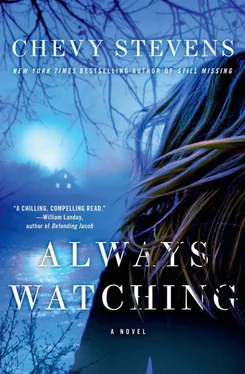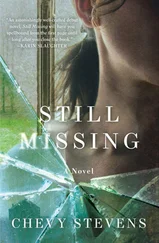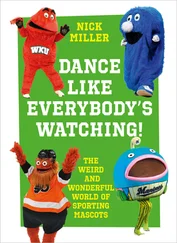Chevy Stevens
ALWAYS WATCHING
The first time I saw Heather Simeon, she was curled into a ball in the seclusion room at the hospital, a thin blue blanket tight around her, the bandages sharp white lines circling her wrists. Her blond hair obscured most of her face. Even then, she still gave off a sense of refinement, something in the high cheekbones barely visible through the veil of her hair, the beautifully arched brows, the patrician nose, the delicate outline of pale lips. Only her hands were a mess: the cuticles raw and bleeding, the nails jagged. They didn’t look bitten, they looked broken. Like her.
I’d already read her file and talked with the emergency psychiatrist who’d admitted her the night before, then gone over everything with the nurses, most of whom had worked in the Psychiatric Intensive Care Unit for years, and who were also my best sources of information. I might spend fifteen minutes to an hour with each patient during my morning rounds, but the rest of the time I was at my office in the Mental Health building, treating patients who are out in the community. That’s why I like to bring a nurse with me when I first meet a patient, so we’re on the same page with the care plan. Michelle, a cheerful woman with curly blond hair and a wide smile, was with me now.
Heather’s husband had come home the night before to find her sprawled on the kitchen floor, the knife near her hand. When she was admitted to the hospital, she’d become agitated, crying and fighting the nurses. The emergency-room doctor ran a drug screen that came back clear, so she’d been given Ativan and placed in the seclusion room. She was under close observation on the monitor, and a nurse checked on her every fifteen minutes.
She’d been sleeping all night.
I knocked softly on the door frame. Heather stirred and opened her eyes, blinked a few times. I stepped closer to the bed. She gazed up at me, licked her lips, which were dry and chapped, then swallowed. Her mouth parted as if she were going to say something, but only her breath escaped in a long sigh. Her eyes were dark blue.
“Good morning, Heather,” I said in my gentlest voice. “I’m Dr. Lavoie, the attending psychiatrist.” When I had my private practice up island, my patients called me Nadine. But since moving to Victoria to work at the hospital, I’d started using my title, had come to like the emotional distance—one of the reasons for my move in the first place. “Would you like some water?”
She was staring somewhere over my shoulder, her expression blank, devoid of sorrow or anger. She might not have succeeded in checking out physically, but she had definitely disappeared emotionally.
“I’d like to talk with you for a little bit if that’s okay.”
Her eyes skimmed past me, landing on Michelle. She pulled the blue blanket tight around her.
“Why… is she here?” Her voice was a whisper.
“Michelle? She’s one of our nurses.”
On the psychiatry floor, the doctors are generally in business casual, the nurses dressed more for comfort. Michelle tended to favor fun clothes, today a funky striped shirt with dark denim dress jeans. Unless you noticed the ID badge around her neck, you might not realize she was a nurse.
Heather’s body language was defensive, almost cringing under the blanket, her gaze flicking back and forth between us like a cornered animal’s. Michelle stepped back, but Heather still looked overwhelmed. Some patients felt ganged up on when we brought a nurse in with us.
I said, “Would you be more comfortable just talking to me?”
She gave a small nod as she worried a corner of her bandage with her teeth. Again, I was struck with the image of a wild animal trying to escape its bindings. I glanced at Michelle, signaling that it was okay for her to leave.
Michelle smiled at Heather.
“I’ll check on you later, honey. See if you need anything.”
I liked Michelle’s warmth with the patients, had noticed it before. She’d often sit and talk with them, even on her breaks. When the door closed behind her, I turned back to my patient.
“Can you tell me how old you are, Heather?”
She slowly said, “Thirty-five,” as she looked around, starting to become more aware of where she was. I saw the room through her eyes and felt bad for her: the small plastic window in the heavy metal door, the Plexiglas cover on the window with scratch marks down it like someone had tried to claw their way out—which someone had.
“And your name?” I said.
“Heather Duncan…” She shook her head, catching herself, but the movement was sluggish, delayed. “Simeon. My name now, it’s Simeon.”
I smiled. “Did you get married recently?”
“Yes.” Not yeah or uh-huh, but yes. She was educated, brought up to speak clearly. Her gaze focused on the heavy metal door. “Daniel… is he here?”
“He’s here, but I’d like to talk with you first. How long have you and Daniel been married?”
“Six months.”
“What do you do for a living, Heather?”
“I don’t do anything now, but I used to work in the store. We take care of the earth.”
I noticed her shift to present tense.
“Are you a landscaper?”
“It’s our job to tend and keep the land.”
I felt an uncomfortable flutter in my stomach about the phrase. It sounded familiar, and she’d also said it like she was reciting an expression she’d heard many times. She was repeating it, not speaking for herself.
“I heard you had a bad night,” I said. “Would you like to tell me what happened?”
“I don’t want to be here.”
“You’re in the hospital because you’ve been certified under the Mental Health Act. You tried to hurt yourself, and we don’t want that to happen again, so we’re going to help you get better.”
She pulled herself up into a sitting position, and I noticed how thin her arms were as she braced on the mattress, the veins popping. Her arms shook as if the effort of holding up her body was exhausting.
“I just wanted it all to stop.” Her eyes filled with tears that weaved down her face, dripped off her nose. One landed on her arm. She stared at it as though she had no idea how it got there.
“What did you want to stop?”
“The bad thoughts. My baby—” Her voice caught and she flinched, gritting her teeth as though something had stabbed her deep inside.
“You had a miscarriage, Heather?” According to her file, she’d lost the baby a week ago, but I wanted to see if she would tell me more about it herself.
Another tear slid down and dropped onto her arm.
“I was three months along. I started bleeding….” She took a breath and let it out slowly through clenched teeth.
I paused, a beat of silence in honor of what she’d just told me, then said, very gently, “I’m sorry, Heather. That must have been very painful for you. It’s normal to have feelings of depression after losing a child, but we can help you manage your feelings so they aren’t so overwhelming. Your file said your doctor prescribed Effexor last year. Are you still taking it?”
“No.”
“When did you stop?”
“When I met Daniel.” I caught the slightly defensive tone and knew she felt guilty that she’d stopped taking the pills, ashamed that she needed them. People with depression often stop their medication when they fall in love, the endorphins creating their own natural antidepressant. Then real life kicks in.
Читать дальше













